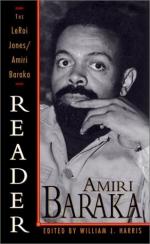|
This section contains 1,511 words (approx. 6 pages at 300 words per page) |

|
SOURCE: "Amiri Baraka: Angry Young Men," in Staging Masculinity: Male Identity in Contemporary American Drama, McFarland & Company, 1997, pp. 30-2.
In the following excerpt from her Staging Masculinity, McDonough studies Baraka's treatment of black manhood in his works.
While [Eugene] O'Neill, [Arthur] Miller, and [Tennessee] Williams were produced chiefly on the main stages of Broadway, the avant-garde, off-Broadway plays of Amiri Baraka (LeRoi Jones), which were often written within and for the Black Revolutionary theater, became a powerful voice for issues of race within American culture, an issue that is at the heart of American identity. His confrontational style of theater is at the forefront of the 1960s off-off-Broadway movement that cultivated Shepard and opened the way for … other dramatists…. Baraka's theater, however, is distinctly masculine in its orientation, as Michele Wallace's Black Macho and the Myth of the Superwoman has so vividly and controversially demonstrated. Wallace argues that...
|
This section contains 1,511 words (approx. 6 pages at 300 words per page) |

|


